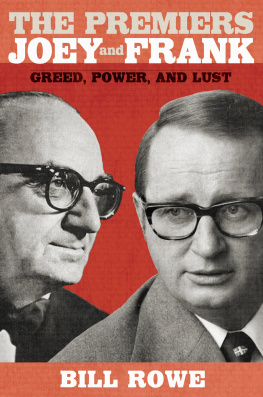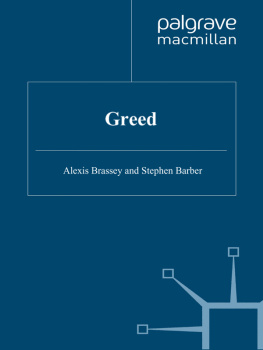Folbre Nancy - Greed, Lust and Gender
Here you can read online Folbre Nancy - Greed, Lust and Gender full text of the book (entire story) in english for free. Download pdf and epub, get meaning, cover and reviews about this ebook. year: 2009, publisher: Oxford University Press, Incorporated, genre: Politics. Description of the work, (preface) as well as reviews are available. Best literature library LitArk.com created for fans of good reading and offers a wide selection of genres:
Romance novel
Science fiction
Adventure
Detective
Science
History
Home and family
Prose
Art
Politics
Computer
Non-fiction
Religion
Business
Children
Humor
Choose a favorite category and find really read worthwhile books. Enjoy immersion in the world of imagination, feel the emotions of the characters or learn something new for yourself, make an fascinating discovery.

- Book:Greed, Lust and Gender
- Author:
- Publisher:Oxford University Press, Incorporated
- Genre:
- Year:2009
- Rating:3 / 5
- Favourites:Add to favourites
- Your mark:
- 60
- 1
- 2
- 3
- 4
- 5
Greed, Lust and Gender: summary, description and annotation
We offer to read an annotation, description, summary or preface (depends on what the author of the book "Greed, Lust and Gender" wrote himself). If you haven't found the necessary information about the book — write in the comments, we will try to find it.
Greed, Lust and Gender — read online for free the complete book (whole text) full work
Below is the text of the book, divided by pages. System saving the place of the last page read, allows you to conveniently read the book "Greed, Lust and Gender" online for free, without having to search again every time where you left off. Put a bookmark, and you can go to the page where you finished reading at any time.
Font size:
Interval:
Bookmark:
The ideas developed here grew, in a topsy turvy way, out of an article I co-authored with Heidi Hartmann, entitled The Rhetoric of Self-Interest: Ideology of Gender in Economic Theory, presented at a conference memorably attended by Robert Coats, Arjo Klamer, Donald McCloskey, and Robert Solow, and published in the conference volume The Consequences of Economic Rhetoric in 1988. I cannot accurately remember or adequately thank all those who have helped me over the last twenty years, but offer a brief chronology of gratitude that begins with institutional thanks.
A generous fellowship from the French American Foundation that sent me to Paris in 19951996 offered me the opportunity to learn more about French history. Jean Heffer of the cole des Hautes tudes en Sciences Sociales served as a superb host and Linda Koike as logistical problem-solver par excellence. A five-year Fellowship from the McArthur Foundation in 1998 gave me the luxury of devoting time to the history of economic ideas. A position as visiting Adjunct Professor at the Social and Political Theory Program Research School of Social Sciences at Australian National University widened my disciplinary horizons. A fellowship at the Russell Sage Foundation in 20052006 helped me expand my ideas. A Samuel F. Conti Fellowship from my own institution, the University of Massachusetts Amherst, facilitated my final revisions.
My friendship with Anthony Waterman, to whom this book is dedicated, has proved one of the most rewarding aspects of this adventure. Despite strong disagreement with many of my specific arguments, Anthony consistently provided warm, supportive, detailed, and extremely knowledgeable feedback. His efforts improved my own intellectual capabilities, as well as the manuscript, in profound ways. Deirdre McCloskey also offered generous encouragement and assistance animated by her love of bourgeois virtues. Thank you, friends, for strengthening my faith in the virtues of academic debate.
The International Association for Feminist Economics (IAFFE) and its journal, Feminist Economics, created a rich new intellectual space for the development of my ideas. I greatly appreciate the largely anonymous efforts of members, officers, editors, and contributors. My close personal and professional relationships with feminist scholars Paula England and Julie Nelson informs everything I write. Im grateful for their direct and indirect contributions to this final product. Robert Goodin of the Research School of Social Sciences at Australian National University also gave me invaluable feedback and encouragement.
I thank Robert Dimand, Evelyn Forget, and Janet Seiz for attending a meeting (along with Anthony Waterman) to discuss an earlier version of this manuscript in San Antonio, Texas in 2002. Conversations with Ulla Grapard and Edith Kuiperas well as their pioneering work in the history of feminist economics, contributed to the development of my ideas. My friend and colleague in Economics at the University of Massachusetts, Carol Heim, gave me the benefit of her broad knowledge of economic history and careful attention to detail. My colleague in English at this university, Nicholas Bromell, offered many discerning comments and suggestions. Others who offered comments and criticisms on specific chapters include Elisabetta Addis, Gerald Friedman, Susan Himmelweit, and Wally Seccombe.
Over the last two years I have used this manuscript in a writing course on the History of Economic Thought, asking students for feedback on my work in return for mine on theirs. I hope we are all better writers as a result. Thanks to my students in Spring 2007: Dalyah Assil, Scott Babineau, John Barrington, Rick Bihrle, Alex Brotschi, Whitney Dorin, Charles Forsyth, Jacob Gordon, Daniel Kelly, Samir Khan, Nathan Kollett, Andrew Mackay, Mitchell Markowitz, Paul Piquette, Tomer Radbil, Michael Sullivan, and Nicholas Swaim. Thanks to those in Fall 2007: James Burbidge, Matthew Donalds, Matthew Greenstein, Sami Korna, Betty Mac, Ali McGuirk, Greg Michalopoulos, Sean Monroe, Michael Monsegur, Huy Nguyen, Matthew Radowicz, Mark Rovenskiy, Alexis Santiago, Christina Shuker, Zach Simmons, Matthew Spurlock, Thien Tran, Alex Weinstein, and Amanda Wong.
My editor at Oxford University Press, Sarah Caro, always responded smartly to my questions and concerns and nudged me in the right directions. The memory of my good friend Helen Smith, superb writer, editor, and independent intellectual, sustained my efforts. My husband Robert Dworak indulged many of my sins. Thanks to all.
While every effort was made to contact the copyright holders of material in this book, there are instances where we have been unable to do so. If the copyright holders contact the author or publisher we will be pleased to rectify any omission at the earliest opportunity.
Abraham, Katherine and Christopher Mackie (eds.), 2005. Beyond the Market, Designing Nonmarket Accounts for the United States, Washington, D.C.: The National Academies Press.
Abray, Jane, 1975. Feminism in the French Revolution, American Historical Review, 80(1), 4362.
Akerlof, George, Michael Katz, and Janet Yellen, 1996. An Analysis of Out-of Wedlock Births in the U.S., Quarterly Journal of Economics, 111 (2), 277317.
Rachel E. Kranton, 2000. Economics and Identity, Quarterly Journal of Economics, 115(3), 71553.
Albelda, Randy, 1997. Economics and Feminism. Disturbances in the Field, New York: Twayne.
Allen, Ruth, 1934. Review of Economics of Household Production, American Economic Review, 24, 7612.
American Rhetoric. Movie Speech: Wall Street, , accessed January, 2008.
Anderson, Gosta Esping, 1990. Three Worlds of Welfare Capitalism, Princeton: Princeton University Press.
Anderson, Perry, 1974. Passages from Antiquity to Feudalism, London: New Left Books.
1979. Lineages of the Absolutist State, London: Verso.
Anonymous, 1854. Occupations of the People, Westminster Review 48, reprinted in Population Problems in the Victorian Age, Westmead: Gregg International Publishers Limited.
1973. Proposals for an Improved Census of the Population, The Edinburgh Review (March 1829), reprinted in Population Problems in the Victorian Age, vol. 1, Westmead: Gregg International Publishers Limited.
Aquinas, Thomas, 1990. On Faith, Summa Theologiae, Part 2-2, Questions 116 of St. Thomas Aquinas, trans. Mark D. Jordan, Notre Dame, IN: University of Notre Dame Press.
Ariely, Daniel, 2008. Predictably Irrational, New York: Harper Collins.
Aristotle, 1935. Metaphysics, Books XXIV, Oeconomica and Magna Moralia, trans. G. Cyril Armstrong, Cambridge, MA: Harvard University Press.
Armstrong, Elizabeth A., Paula England, and Alison C. K. Fogarty, forthcoming. Orgasm in College Hookups and Relationships, in Barbara Risman (ed.), Families as They Really Are, New York: W. W. Norton and Company.
Arrow, Kenneth, 1973. Models of Job Discrimination, in Orley Ashenfelter and Albert Rees (eds.), Discrimination in Labor Markets, Princeton, NJ: Princeton University Press.
Ashcroft, Richard, 1986. Revolutionary Politics and Lockes Two Treatises of Government, Princeton: Princeton University Press.
Aslanbeigui, Nahid, 1997. Rethinking Pigous Misogyny, Eastern Economic Journal, 23(3), 30116.
Astell, Mary, 1704. A Prefatory Discourse to Dr. DAvenant, in Vivien Jones (ed.), Moderation Truly Stated, London: Printed by J. L. for Rich. Wilkin at the Kings Head in St. Pauls Church Yard, xii.
1990. The Hardships of the English Laws in Relation to Wives, in Vivien Jones (ed.),
Font size:
Interval:
Bookmark:
Similar books «Greed, Lust and Gender»
Look at similar books to Greed, Lust and Gender. We have selected literature similar in name and meaning in the hope of providing readers with more options to find new, interesting, not yet read works.
Discussion, reviews of the book Greed, Lust and Gender and just readers' own opinions. Leave your comments, write what you think about the work, its meaning or the main characters. Specify what exactly you liked and what you didn't like, and why you think so.



